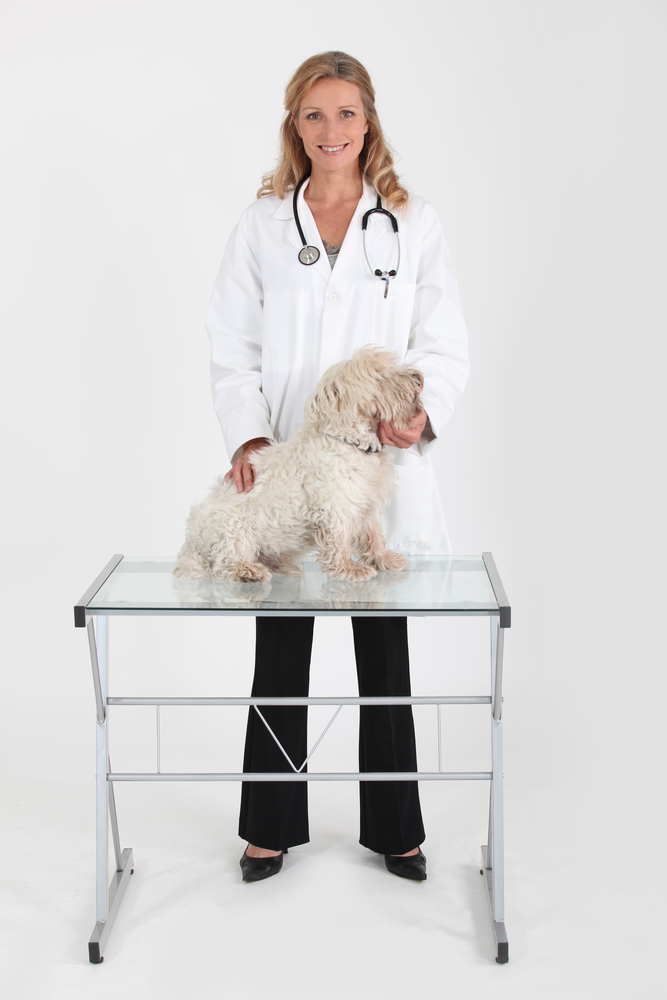Addison’s disease in dogs is also called hypoadrenocorticism. It is a disease that usually affects female dogs that are young to middle-aged. The average age of a dog with Addison’s is 4 years old when she is diagnosed, but old dogs can’t be ruled out.
Not only do dogs get Addison’s, but horses, cats and people can also acquire it. John F. Kennedy, former president of the U.S. is an example of a person who suffered from Addison’s disease.

While any dog, male or female, can get Addison’s, these breeds are the most likely candidates:
- Bearded collies
- Poodles
- Soft Coated Wheaten terriers
- West Highland white terriers
- Portuguese water dogs
- Bassett hounds
- Springer spaniels
- Great Danes
- Nova Scotia duck tolling retrievers
What is Canine Addison’s?
Addison’s disease is a condition where a dog’s adrenal glands (located near his kidneys) do not produce enough hormones to handle normal body functions. Dogs with Addison’s develop abnormalities in heart rhythm, blood pressure, metabolism, immunity, bone health and the nervous system.
Cortisol
One important hormone, cortisol, the “stress hormone”, helps your dog deal with everyday stressors. If you put yourself in your dog’s place, a lot of things are stressful. For example, your dog can feel stressed by being boarded in a kennel, having a package delivered by UPS, meeting new neighbors, or even seeing a strange dog in the neighborhood. Every dog is different, and the level of stress your dog feels in new situations, depends on your dog’s temperament.
If your dog is normal, cortisol kicks in and helps him handle the stressful situation. However, if your dog has Addison’s disease, she will produce too little cortisol. When your dog is placed in a stressful situation, with too few hormones to handle it, she will have more severe symptoms.
In addition, when your dog has too little cortisol, the low level affects almost every system in your dog’s body. Cortisol regulates blood sugars and blood pressure, helps with the breakdown of fats and proteins, regulates the stress response, and stimulates red blood cell production.
Aldosterone Hormones
Reduction in aldosterone hormones also has a huge impact on your dog’s body. These hormones regulate sodium, potassium and chloride levels; reduced levels of them leads to problems in the kidneys, heart and circulatory system.
If you suspect Addison’s disease in your dog, you might consider purchasing this helpful book, Addison’s Disease in Dogs by S. Kenrose.
What Causes Addison’s Disease in Dogs?
While there are a number of reasons why dogs get Addison’s, vets believe that the most common is cause is when an auto immune condition attacks your dog’s own body. It’s called immune mediated destruction and can permanently damage to your dog’s adrenal glands, eventually causing them to totally shut down or fail.
However, there are other conditions that can cause adrenal damage or destruction in a dog. Hormonal imbalance for one reason or another and cancer in other parts of the body are among these possibilities.
In addition, the conditions that cause an Addisonian’s crisis discussed below need to be included.
An Addisonian Crisis is an Emergency
Commonly, a dog is diagnosed only when she has an adrenal crisis. Symptoms develop slowly over time and you hardly notice them from day to day—until your dog has a crisis.
That’s the good news and the bad news. Your dog needs emergency help fast during a crisis, but you now know that she has a problem that can be treated easily.
Sometimes an Addisonian crisis is caused by giving a dog with Cushing’s too much medication. Instead of normalizing the dog’s cortisol level, the excess medication makes his cortisol level drop too low.
To avoid this kind of emergency, if your dog has Cushing’s, keep his medications out of his reach. Dogs with Cushing’s have ravenous appetites, and your dog might overdose without your knowledge.
In addition, if your dog takes prednisone for another medical condition, she can go into crisis mode if the drug is withdrawn too rapidly. If you are taking your dog off steroids, make sure that you do this, only with the supervision of your vet.
Symptoms of an Adrenal Crisis
An Addisonian or adrenal crisis is a medical emergency. Dogs in crisis will show sudden weakness, severe diarrhea and vomiting, and they may collapse. If this happens to your dog, you need to get him to a vet immediately.
A dog in crisis needs to be hospitalized and treated with intravenous fluids to restore her body fluids, salt and sugars to normal. Hormone replacement will follow.
Treatment for Addison’s Disease in Dogs
In the beginning, your vet will do tests to measure your dog’s hormones and electrolyte levels. Her medicine dosage will be adjusted, as needed. As time goes on, your vet will probably adjust the dosage higher as your dog ages, especially during times of stress.
Your vet may recommend a monthly shot to help keep your dog’s hormones in balance. In addition, your dog will need to have regular blood and urine tests to make sure the meds are working.
In some cases, a product like Vetfliz’ Adrenal Balance can help restore hormone balance to your dog’s body. Interestingly this works for either Addison’s or Cushing’s disease. Using a natural approach to balance your dog’s hormones is easier on your dog than drugs, and it is often much less expensive.
To make sure that your dog is protected, you can buy a medical tag for her collar that says that she has Addison’s and needs medications.
Diet for Canine Addison’s
There are a couple of approaches to feeding your dog with Addison’s. No matter what you decide to do, make sure that your dog’s food is appropriate for her age.
Some veterinarians recommend putting your dog with Addison’s on a raw food diet. This doesn’t mean that you have to cook for your dog. Fortunately you can buy excellent dog foods now, that are made from raw foods and are dehydrated. A couple of examples are:
- Stella & Chewy’s Freeze Dried Raw Meat Patties
- Ziwi Peak Air-dried Dog Food (several flavors to choose from)
- Primal Pet Foods Freeze-dried Chicken Nuggets
The dog foods I just mentioned have very few ingredients. If you prefer to have a diet for your dog that includes other healthy ingredients, you might want to consider dog foods like:
- Diamond Naturals Beef & Rice for Adult Dogs
- Pedigree Chicken & Steak Formula
- Purina Pro Plan with Probiotics
Prognosis for Addison’s Disease in Dogs
The prognosis for most dogs with Addison’s is good to excellent. And most dogs who receive proper treatment for their Addison’s, will have a normal life span. With your dog’s hormones in balance, she will live to the same age as a dog without Addison’s. A fairly common health problem in Bichons, this condition is definitely treatable.
Unfortunately, there is no cure for Addison’s disease in dogs. Once your dog is placed on hormone therapy, she will need to be treated for the rest of her life.
On the other hand, untreated Addison’s has an entirely different outcome. Lack of hormones in your dog’s body will lead to all kinds of problems, and this will eventually lead to your dog’s death.

Leave a Reply